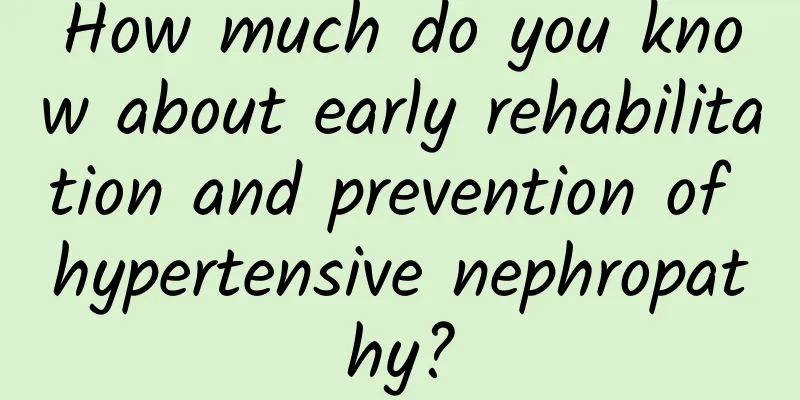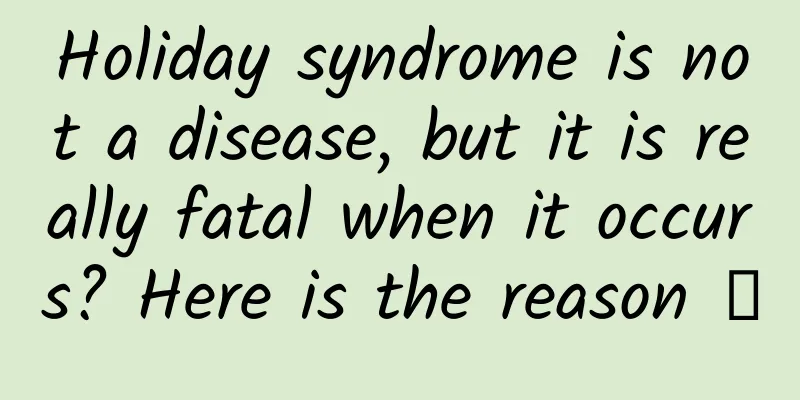How much do you know about early rehabilitation and prevention of hypertensive nephropathy?

|
Rehabilitation and prevention of hypertension is a global public health issue. According to official authoritative data, the data published in the "Blue Book on the Current Status of Hypertension Prevention and Treatment in China 2018" released by the National Health Commission in August 2019 predicts that the prevalence of hypertension in my country will reach 31.89% in 2019; the number of people aged 18 and above with hypertension will reach 358 million. Hypertension can cause complications in multiple organs such as the heart, brain, and kidneys, leading to high disability and mortality rates. Among them, 20% of patients will have chronic kidney damage. Hypertensive nephropathy is often the result of the "collusion" between hypertension and multiple kidney diseases, which seriously endangers the quality of life and health of patients. So how can we carry out early rehabilitation and prevention of hypertensive nephropathy to avoid damage to target organs such as the heart, brain, and kidneys caused by continued high blood pressure? 1. What is hypertensive nephropathy? Hypertensive nephropathy is a damage to kidney structure and function caused by essential hypertension, which is divided into benign hypertensive nephrosclerosis and malignant hypertensive nephrosclerosis. Hypertensive nephrosclerosis is caused by long-term effects of high blood pressure (≥140/90 mmHg) on the kidneys. Malignant hypertensive nephrosclerosis refers to kidney damage caused by the development of malignant hypertension (diastolic blood pressure > 130 mmHg) on the basis of essential hypertension. 2. What are the risk factors for hypertensive nephropathy? Hypertensive nephropathy is the result of the interaction between hypertension and multiple kidney diseases. Therefore, the inducing factors of hypertension are also the inducing factors of hypertensive nephropathy. ① High-salt diet factor: People in northern my country tend to prefer salty food and are more likely to suffer from hypertension and kidney disease than people in southern China. ② Drinking factor: The weather in the north is cold, and people like to drink to ward off the cold, so they are more likely to suffer from hypertension and kidney disease than people in the south. ③Weight and obesity factors: Weight gain not only leads to obesity, but also increases the incidence of hypertensive kidney disease. ④ Trace element deficiency factors: Calcium deficiency in the human body is also one of the common causes of hypertension. ⑤Psychological factors: work stress, heavy mental burden, irregular life, staying up late for a long time, lack of sleep or rest can all cause the occurrence of hypertensive nephropathy. ⑥ Weather factors: As the weather gets cooler, the blood vessels in the skin and subcutaneous tissue contract, causing the peripheral vascular resistance to increase, thereby increasing the incidence of hypertensive nephropathy. ⑦Genetic factors: Hypertension has a strong genetic tendency, but genetic factors will only lead to high blood pressure when they interact with environmental factors. 3.What are the clinical symptoms of hypertensive nephropathy? The main symptoms of hypertensive nephropathy are manifestations of hypertension itself and the kidney diseases it causes. They are as follows: ② Hypertensive nephropathy: Mainly manifested by proteinuria, foamy urine and other kidney damage symptoms; severe cases may cause damage to the heart, brain, eyes and other organs. Heart symptoms include chest tightness, shortness of breath, heart failure, etc. Brain symptoms include cerebral arteriosclerosis, even cerebral thrombosis or cerebral hemorrhage, etc. Eyes may have blurred vision, even fundus hemorrhage, etc. Severe renal failure may cause digestive system symptoms such as nausea and vomiting, and blood system symptoms such as anemia and hypoproteinemia. 4. What is the early rehabilitation and prevention of hypertensive nephropathy? ① Regular physical examinations and regular blood pressure measurements. People with hypertension should regularly test urine routine, blood urea nitrogen, creatinine, etc., and closely monitor renal function. ② If hypertension is discovered early, regular and systematic antihypertensive treatment should be adhered to to keep blood pressure within the normal range. ③ Those who have been found to have renal impairment should pay attention to protecting renal function, avoid using nephrotoxic drugs, prevent colds, respiratory and urinary tract infections, fever, avoid mental stress, emotional excitement and excessive fatigue, etc. ④ For severe hypertensive kidney disease, the treatment should be to slowly lower blood pressure, and the diastolic blood pressure should not be less than 90-100 mmHg. Too low blood pressure will be detrimental to renal blood perfusion and further damage renal function. 4. What is the early rehabilitation and prevention of hypertensive nephropathy? ① Regular physical examinations and regular blood pressure measurements. People with hypertension should regularly test urine routine, blood urea nitrogen, creatinine, etc., and closely monitor renal function. ② If hypertension is discovered early, regular and systematic antihypertensive treatment should be adhered to to keep blood pressure within the normal range. ③ Those who have been found to have renal impairment should pay attention to protecting renal function, avoid using nephrotoxic drugs, prevent colds, respiratory and urinary tract infections, fever, avoid mental stress, emotional excitement and excessive fatigue, etc. ④ For severe hypertensive kidney disease, the treatment should be to slowly lower blood pressure, and the diastolic blood pressure should not be less than 90-100 mmHg. Too low blood pressure will be detrimental to renal blood perfusion and further damage renal function. ⑦ Adjust your mentality, reduce stress, and pay attention to the combination of work and rest. Especially those who are engaged in mental work or work that is often in a state of mental tension should adjust their pace of life after work and participate in more relaxing and enjoyable sports or entertainment activities. |
<<: What is the meaning of eating mooncakes on August 15th? Why do we eat mooncakes?
Recommend
How to increase milk supply
For a newborn baby, breast milk is its main sourc...
Will the fetus still stop growing if there is a fetal heartbeat or fetal bud at 8 weeks of pregnancy?
When a woman is 8 weeks pregnant, she will have f...
How many weeks of pregnancy
There has always been a phrase "ten months o...
What to do if private parts turn black?
I believe that many female friends are troubled b...
Uterine prolapse training method diagram
Now many women experience uterine loosening after...
Man dies of sudden cardiac death after taking painkillers, revealing heart health crisis
Recently, a news report about a man who died sudd...
Causes of right groin pain in women
I believe everyone knows the importance of the gr...
Treatment of tinea cruris in women
Women are more likely to develop tinea cruris, an...
Did vaginal ultrasound misdiagnose ectopic pregnancy?
Under normal circumstances, the fetus grows and d...
Acne next to breast
Having pimples on the chest is the most embarrass...
Women's feet feel numb when sleeping
If you maintain a posture for a long time, you wi...
Can pregnant women take medicine for constipation?
Sometimes people will get irritated and cause con...
What should I pay attention to before getting an IUD?
When it comes to IUD insertion, I believe many mo...
38 weeks of pregnancy, little and light fetal movement
Pregnant women should go to the hospital for B-ul...









